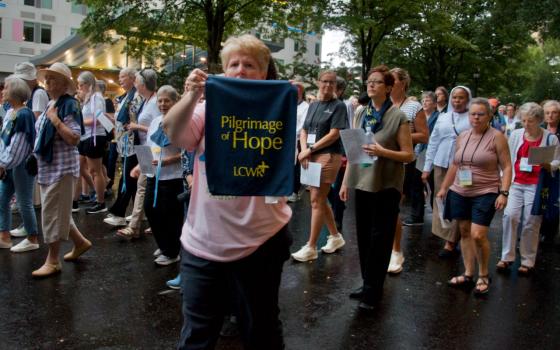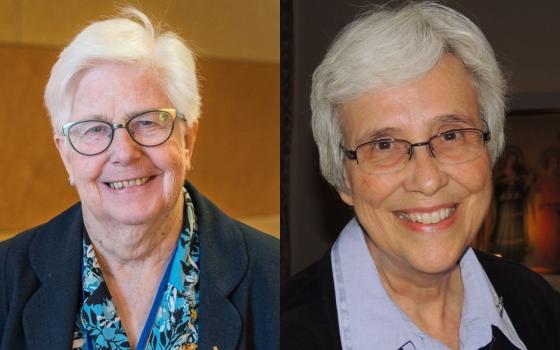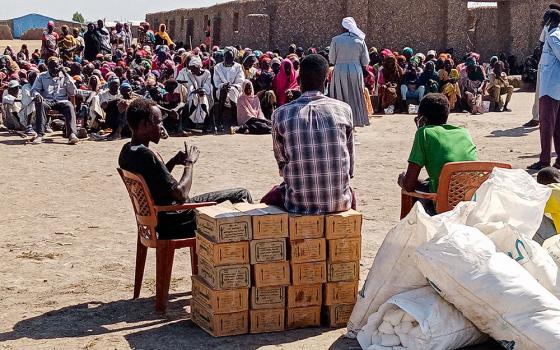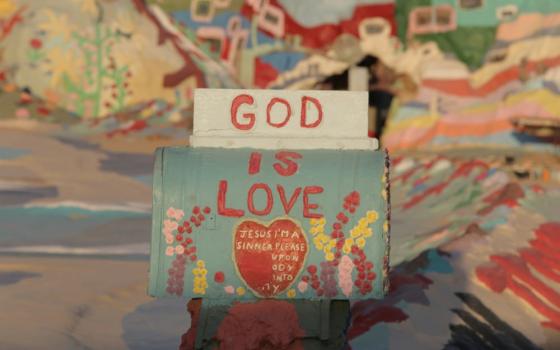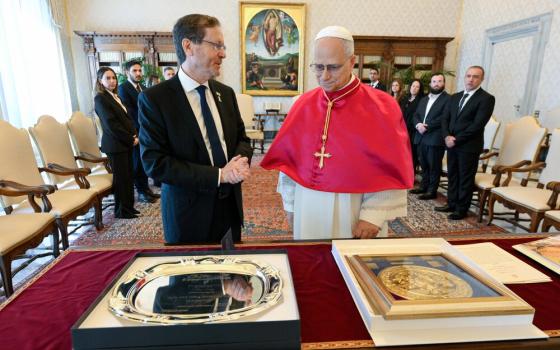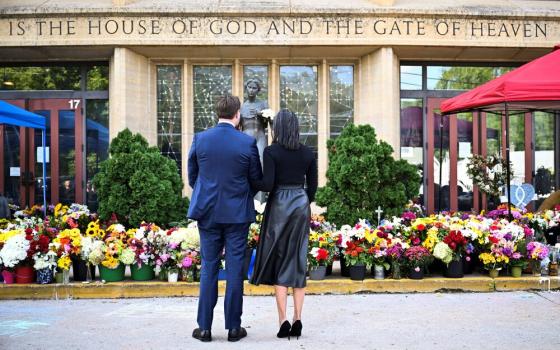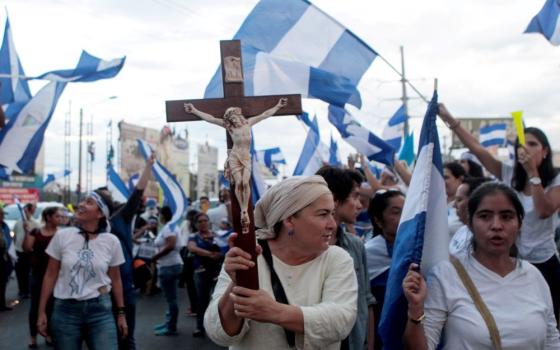Members of various nonprofits and a historical memory group pose for a photo March 26, 2017 at the inauguration and blessing of a mural in Zaragoza, El Salvador featuring the four U.S. Catholic women assassinated in the Central American country Dec. 2, 1980. Four decades after the killings, the example of their faith still inspires others to continue their work. St. Oscar Romero, slain while saying Mass March 24, 1980, also is featured. (CNS photo/Fatima Pacas for International Partners in Mission via Melissa Altman of Maryknoll Lay Missioners)
Putting the words of the Gospel into action was always an important part of Melissa Altman's Catholic family in Pennsylvania.
Some of her childhood experiences of that family cornerstone came from a great uncle, a Maryknoll priest, who ignited the kindling of a spiritual fire that led her down the road to learn more about the life and experiences of missioners.
Some of them included two Maryknoll sisters, a layperson who had completed the lay missionary training course at Maryknoll in New York, and an Ursuline sister — all four missionaries were murdered in El Salvador in 1980, just a year after Altman was born.
How the women lived and their work in El Salvador would prove to be an inspiration that later moved Altman and her husband, Peter, to move their young family to the small but troubled Central American nation.
She said that what she knew about the women and their work, coupled with learning in college about the effects of the Cold War on Latin America, and U.S. ties to it, "really affected me, and it planted a seed that I didn't even realize was there at that time."
"That seed was planted, and it kept growing without me realizing it," Altman said in a Nov. 18 interview with Catholic News Service.
In 2014, she and her husband moved their children, a 3-year-old daughter and a 7-year-old son, from New York to the countryside of El Salvador.
While she and her husband first worked in the Salvadoran countryside, offering recreational programs for children, Altman, now a Maryknoll lay missioner, lives and works with a cooperative for women in the city of Zaragoza, El Salvador, in the department of La Libertad, where two of the murdered women, Ursuline Dorothy Kazel and laywoman Jean Donovan lived.
The two had ties to the two Maryknoll Sisters, Ita Ford and Maura Clarke, who also worked with the poor in the rural setting of Chalatenango in northern El Salvador.
The four women collaborated in seeking refuge for those battered by the country's civil strife that reached a boiling point during the last months of the women's lives in late 1980. The four would end up being buried in a shallow grave together after being raped and killed by Salvadoran military.
"I am lucky to be working in a community that actually knew them," Altman said of the U.S. women.
Since many in the Salvadoran community of Zaragoza, where Altman and her family live, know the legacy of the U.S. missionary women who shuttled children to safety, as well as food and medicine between La Libertad and Chalatenango, "they knew what I was about because of Maryknoll," she said.
"That brought me close to the memory and energy of the four women and Carla Piette (another Maryknoll missionary sister who died there) and other catechists who put their life out there for human dignity in this country," Altman told CNS. "I connected with that."
She is now connected with them in a different way, after having collaborated with nonprofits and a historical memory group that painted a popular mural of martyrs in Zaragoza in 2016. It features the U.S. women next to St. Oscar Romero, the iconic archbishop of El Salvador martyred March 24, 1980, a few months before the women were assassinated.
Advertisement
The experience of mission work has been a gift to her children, she said.
"We wanted to give our kids an opportunity to see the world as it really is and not just through this bubble," Altman said. "We wanted to experience living in a different culture but also putting Catholic Social Teaching to action, truly living that out."
Putting Catholic social teaching into action through the example of the missionary women she aims to follow sometimes means just being there for people, carrying out the concept of accompaniment, she said.
"To say, 'I don't have the answers, but let's figure it out together, go through it together,'" she said. "It is the root of my faith to say: 'you're important, your life matters, you have dignity and I want to be with you in this journey, whatever happens,'" she said.
It echoes words Sr. Ford wrote in 1977 about her experience with the people of Latin America: "Can I say to my neighbors — I have no solutions to this situation; I don't know the answers, but I will walk with you, search with you, be with you. Can I let myself be evangelized by this opportunity? Can I look at and accept my own poorness as I learn it from other poor ones?"
Altman said the concept Sr. Ford spoke about "is important here and such a part of the culture," that it's a privilege to continue "the groundwork they laid during the darkest times."
The last of the Maryknoll community of women religious left a couple of years ago, she said. After their community closed, six lay missioners and two priests continue what they started there, she said.
Back in the U.S., it was at first a bit daunting for Altman's extended family to see her cart off her children to a country far from home. They used to ask: "When are you going to come home?" she said.
And she would reply: "Well, this is kind of home now."
Her daughter doesn't remember much about the U.S. and her son, at 13, has become interested in the rural communities where they first lived, often defending the rural life his friends in the city sometimes look down on.
"It's been life-giving, to see the richness of when we lived in the countryside, the traditions, the foods, the hospitality, not to say that people in city aren't hospitable," she said.
"But in the 'campo' (the countryside), everybody has time to chat and take a few moments to see how you're doing," Altman said. "My son advocates for rural areas because he lived there. His good friends are still there and it's a good opportunity to advocate for them to city kids who have a prejudice against those who live in the campo."
With time, her family in the U.S. learned that what they were doing was linked to the Catholic values they had inspired in her as a child.
"My family is very religious, very Catholic," she said. "As hard as it was to know we were going far away, they are very spiritual, and they can see that we're happy, our kids are happy, that we feel fulfilled in what we're doing here and to them that's a really important part of living out your faith, your calling. We're doing that."
To some, that's still a difficult concept.
"People will say, 'Oh, look at all that you left (behind),' but there's a lot of really good things here," she said. "From the outside in, the news, you can't see that. But if you are here and you get a chance to be around these communities, you get a chance to see what's genuine."

